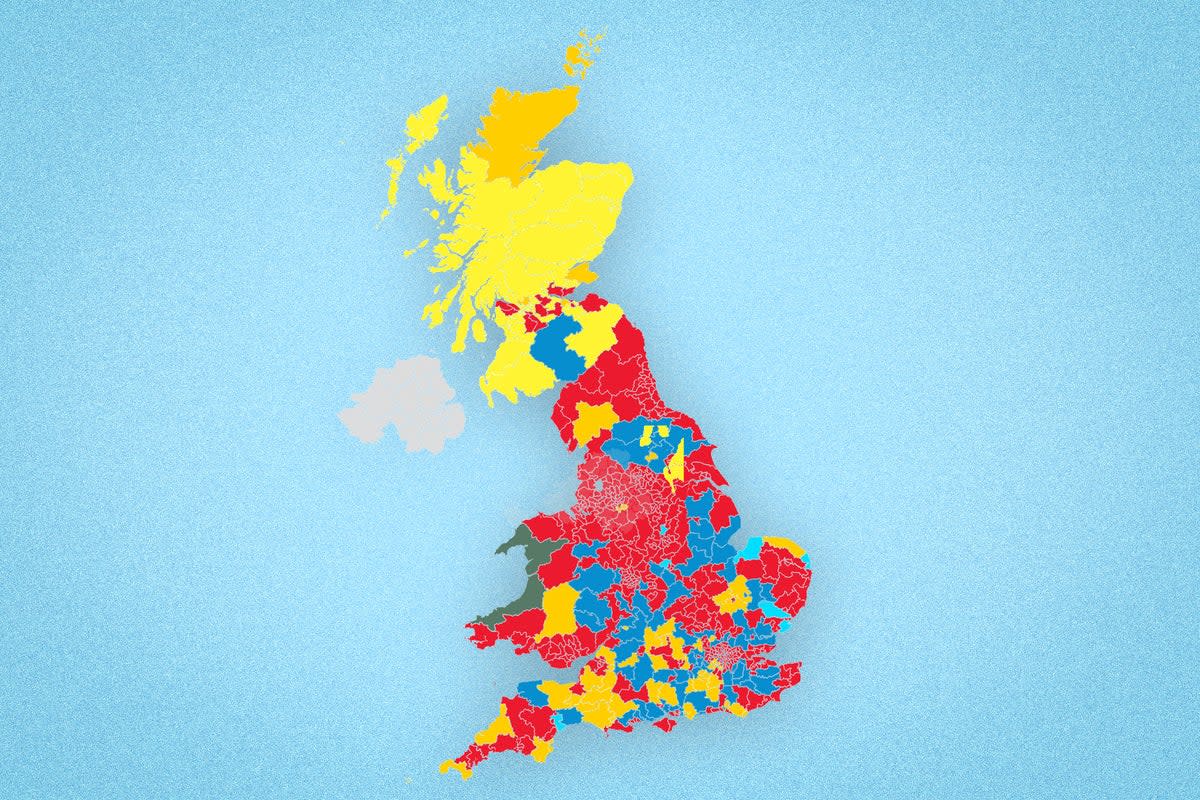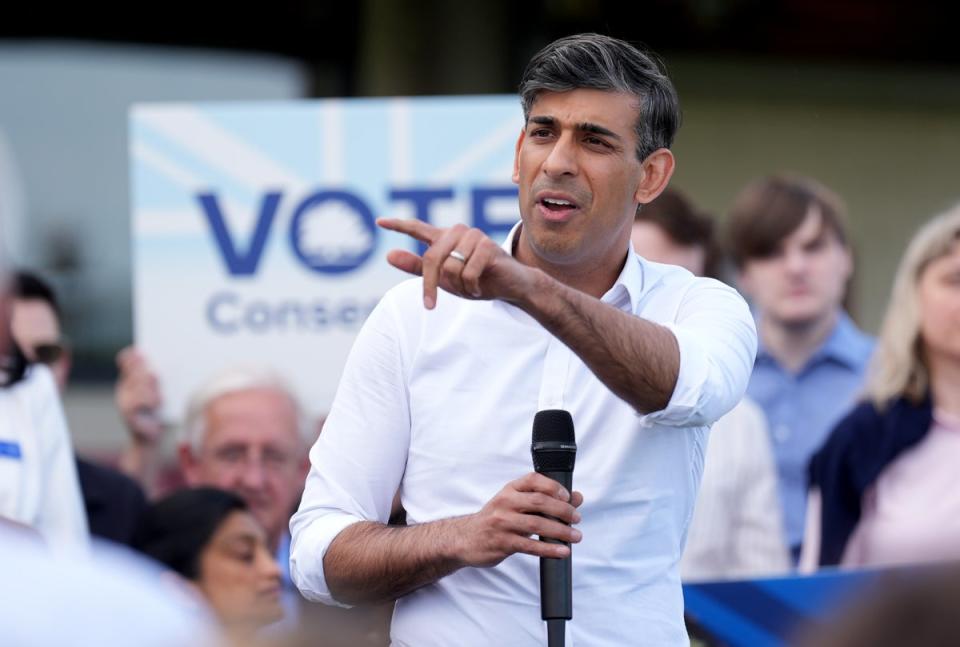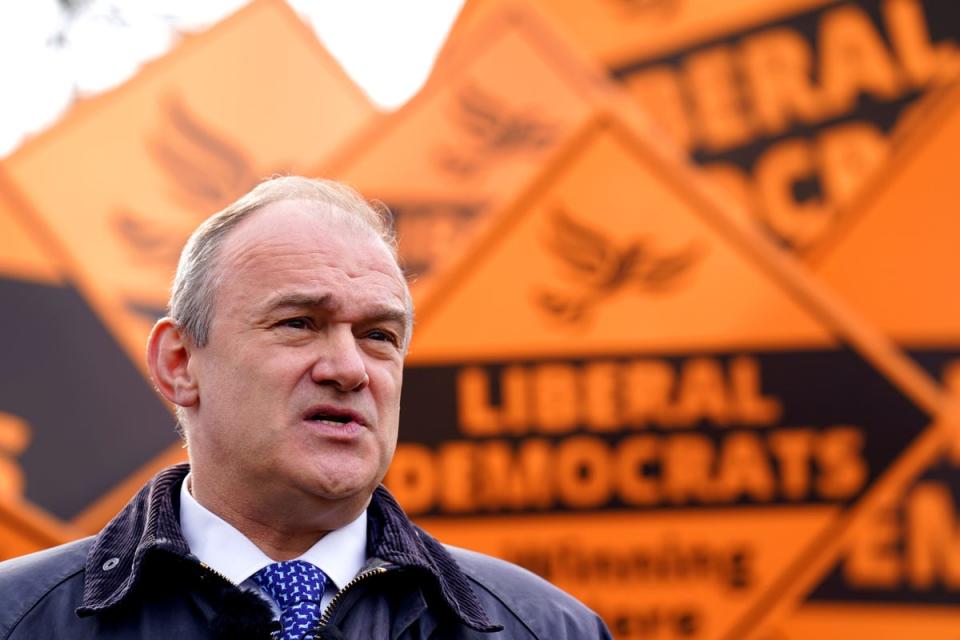What is tactical voting and where has it been encouraged in the 2024 general election?

- Oops!Something went wrong.Please try again later.
Britain will head to the polls on July 4 after prime minister Rishi Sunak called a snap general election at the end of May.
June has seen intense vote-garnering efforts from all political parties as leaders chat, debate, and even paddle across the country to win over as many as possible. All parties have now revealed their election manifestos, laying out their vision for the country.
Current polling would suggest things are not looking good for the Conservatives, with most trackers firmly putting Labour an average 20 points ahead of the governing party.

However, recent research by campaign group Best for Britain shows that 36 per cent of people are undecided in some constituencies. In more bad news for the government, the group has also identified 451 ‘tactical voting seats’ where voters have the best chance of ousting the Tories.
Here’s everything you need to know about tactical voting and how important it could be in the upcoming general election:
What is tactical voting?
Tactical voting is when a voter casts their ballot for the candidate they believe is most likely to defeat another party’s candidate (usually the Conservatives), even if this candidate is not necessarily their first choice.
Some see this as a necessary practice due to the UK’s ‘First Past The Post’ (FPTP) voting system. Under FPTP, it is the candidate who gets the most votes that wins.
It may seem like the most democratic system to decide a winner at first glance, but many argue that FPTP does not always produce results that reflect the political leanings of the area.
This is because some parties are much more politically aligned than others. For instance, in areas where the votes for Labour and the Liberal Democrats outweigh that for the Conservative candidate, but neither beat them alone, the Conservative candidate wins.

However, the results would indicate that the majority of voters in this area support more progressive, left-wing or centre-left politicians.
Groups such as the Electoral Reform Society (ERS) campaign to change this, pointing out that the MPs elected to parliament rarely reflect the popular vote.
For instance, at the 2019 general election, 11.5 per cent of people voted for the Liberal Democrats, but they only secured 1.7 per cent of seats. The Conservatives’ 43.6 per cent, on the other hand, translated to 56.2 per cent of seats.
The ERS promotes voting systems that are designed to tackle this issue, such as the Single Transferable Vote or Alternative Vote where voters can rank candidates by preference.
However, in 2011 the UK was given a referendum on switching the way people vote to the Alternative Vote system, where the votes against it were nearly 68 per cent.
Where has tactical voting been recommended?
Ahead of polling day, campaign group Best for Britain has produced a list of tactical voting recommendations for voters who are keen to see the Tories ousted from government.
The group recommends 451 candidates across the UK, around 70 per cent of MPs. These comprise 370 seats for Labour, 69 for the Lib Dems, seven for the SNP, three for the Greens and two for Plaid Cymru.
Amongst the many seats targeted are those of Jacob Rees-Mogg (North East Somerset), Liz Truss (South West Norfolk) and Suella Braverman (Fareham and Waterlooville).
If tactical voting was carried out according to their plan, Best for Britain project the Conservatives could wake up to as few as 45 seats on July 5, an astounding loss of 320. Meanwhile, Labour would take an average of 445, gaining 243.
Does tactical voting work?
Tactical voting could work, if it was carried out en masse. However, despite talk of tactical voting at most major elections, there is little evidence that it has made a significant impact in the past.
There are many seats in the UK where a sustained tactical vote campaign would have changed the final result. For instance, in the 2023 Uxbridge by-election, the Conservatives secured 13,965 votes, while Labour secured 13,470.
Meanwhile, the Greens gained 893 votes, coming in third. If all these votes were instead tactically given to Labour, it would have been a victory for the party in Boris Johnson’s former seat.
It is a similar story for the seat of Somerset North East, held by Jacob Rees-Mogg since 2010. In 2019, Mr Rees-Mogg secured 28,360 votes, while Labour and the Lib Dems combined secured 26,053.

It is possible a combined effort could’ve secured the seat for either party, although neither has assented to a tactical voting pact in the past.
However, the Lib Dems won the seat of Somerton and Frome for the first time since 2010 in last year’s by-election, with tactical voting thought to be a major factor. The Labour vote share had dwindled from 12.9 per cent in 2019, to just 2.6.
“It is no secret that some Labour and Green party voters lent us their votes in Somerset and we are very grateful for their support,” said Lib Dem leader Ed Davey.
“In many seats across the south-west, voters at the next election will be faced with a similar choice between the Liberal Democrats and the Conservatives.”
What impact could tactical voting have on the 2024 General Election?
Polling experts have said an increase in tactical voting is “bad news for the Conservative Party”, but there may still be some three-way marginal seats between the Tories, Labour and the Lib Dems.
Chris Hopkins, political research director at leading polling consultancy Savanta, told The Independent: "Voters have got increasingly sophisticated in understanding how in a first past the post system, their vote can be as effective as possible.
“In particular this is bad news for the Conservative Party, where there will be plenty of natural Labour supporters in the South West who will back the Lib Dems, as they know they are their best chance of getting rid of the Tories.
"That being said, because of the forecasted size of the swing from Conservative to Labour, there are some three-way marginals where Labour and the Lib Dems may be unwilling to step aside. That could mean voters are told different things about who is 'most likely to win here', and could lead to split, enabling some Conservative MPs to hold on."

Campaigners have also added tactical voting will help deliver a “progressive government”, but warned the first-past-the-post system (FPTP) must be changed to better represent voting intentions.
Neal Lawson, executive director at Compass, told The Independent: “We desperately need a progressive government, and tactical voting will no doubt play a vital role in helping to deliver one - but voting tactically without conditions only entrenches the pendulum politics that grinds us all down and alienates voters from the political process.
“The worry is that without a commitment to changing the system, tactical voting enshrines the abusive nature of First Past the Post and forces voters to continue voting tactically forever more.
“If Labour does win the next election on the back of lent votes, they should commit to getting rid of FPTP and replacing it with a system that can better represent the progressive majority that already exists in this country.”
Naomi Smith, CEO of Best for Britain and founder of tactical voting platform, GetVoting.org, said: “Our polling shows 13 million Brits are ready to vote tactically for change, and these voters will be key to a defeat that would keep the Tories out for a decade and the difference between deliverance or defeat for the likes of Rishi Sunak, Jeremy Hunt and Liz Truss.
“Best for Britain will be helping voters get it right at GetVoting.org with expert constituency level insights and voting recommendations before polling day.”

